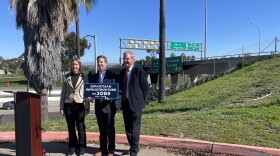Aiden Avalos was one of 40 or so students huddled in a circle on a cloudy day on a pier in La Jolla. He was peering over shoulders to get a glimpse of the plankton caught by researchers.
The 10-year-old said he’s wanted to be a veterinarian all his life, but he’s never been interested in the animals that live in the ocean. That changed when he saw his first tide pool.
The fifth-grader was one of hundreds of students from low-income schools visiting Scripps Institution of Oceanography last Wednesday. They live less than 15 miles from the shore, but for some of the students, it was their first time at the beach. And for Avalos, it’s the first time seeing the ocean through the eyes of a scientist.
“I’m curious about how some animals live and how they grow,” he said. “It’s really interesting."
Avalos is a student at the STEAM Academy in Spring Valley. In class, he’s read about the ocean, but after spending the day examining tidepools and peering through microscopes, Avalos has gotten his feet wet in a field he never considered.
RELATED: City Heights Kids’ 2-Hour Trek To Beach Highlights Inequities
Avalos' visit to Scripps was supported by the League of Extraordinary Scientists and Engineers, or LXS, a nonprofit that connects students from low-income communities to scientists.
“You hear so often that these kids have never even been to the beach, and they live in San Diego County,” said Jeane Wong, founder and CEO of LXS, which covered the costs of busing students to the beach.
She said the barriers become apparent when she looks at the transportation costs. A bus from a San Diego city school costs about $280. A bus from farther inland can cost up to $1,000.
“That price tag in itself is screaming inequity,” she said.
Before LXS, Aiden’s class trips were restricted to about a 10-mile radius, according to his teacher John Uhren.
“They were able to have a concrete connection with a lot of the animals that we studied,” Uhren said. “That’s something we weren’t able to deliver here at school.”
Wong hopes exposing students at an early age to the study of oceanography will diversify the field in the long-term.
“We need more people from different backgrounds, to see the ocean, to study it and to share it with each other,” she said.
For Avalos, the visit to Scripps made science a reality.
“I read about the ocean and fish and plankton,” he said. “Coming out here makes you think it’s a totally different thing.”







